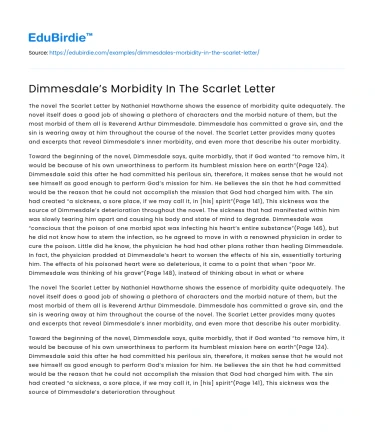The novel The Scarlet Letter by Nathaniel Hawthorne shows the essence of morbidity quite adequately. The novel itself does a good job of showing a plethora of characters and the morbid nature of them, but the most morbid of them all is Reverend Arthur Dimmesdale. Dimmesdale has committed a grave sin, and the sin is wearing away at him throughout the course of the novel. The Scarlet Letter provides many quotes and excerpts that reveal Dimmesdale’s inner morbidity, and even more that describe his outer morbidity.
Toward the beginning of the novel, Dimmesdale says, quite morbidly, that if God wanted “to remove him, it would be because of his own unworthiness to perform its humblest mission here on earth”(Page 124). Dimmesdale said this after he had committed his perilous sin, therefore, it makes sense that he would not see himself as good enough to perform God’s mission for him. He believes the sin that he had committed would be the reason that he could not accomplish the mission that God had charged him with. The sin had created “a sickness, a sore place, if we may call it, in [his] spirit”(Page 141), This sickness was the source of Dimmesdale’s deterioration throughout the novel. The sickness that had manifested within him was slowly tearing him apart and causing his body and state of mind to degrade. Dimmesdale was “conscious that the poison of one morbid spot was infecting his heart’s entire substance”(Page 146), but he did not know how to stem the infection, so he agreed to move in with a renowned physician in order to cure the poison. Little did he know, the physician he had had other plans rather than healing Dimmesdale. In fact, the physician prodded at Dimmesdale’s heart to worsen the effects of his sin, essentially torturing him. The effects of his poisoned heart were so deleterious, it came to a point that when “poor Mr. Dimmesdale was thinking of his grave”(Page 148), instead of thinking about in what or where
Save your time!
We can take care of your essay
- Proper editing and formatting
- Free revision, title page, and bibliography
- Flexible prices and money-back guarantee
The novel The Scarlet Letter by Nathaniel Hawthorne shows the essence of morbidity quite adequately. The novel itself does a good job of showing a plethora of characters and the morbid nature of them, but the most morbid of them all is Reverend Arthur Dimmesdale. Dimmesdale has committed a grave sin, and the sin is wearing away at him throughout the course of the novel. The Scarlet Letter provides many quotes and excerpts that reveal Dimmesdale’s inner morbidity, and even more that describe his outer morbidity.
Toward the beginning of the novel, Dimmesdale says, quite morbidly, that if God wanted “to remove him, it would be because of his own unworthiness to perform its humblest mission here on earth”(Page 124). Dimmesdale said this after he had committed his perilous sin, therefore, it makes sense that he would not see himself as good enough to perform God’s mission for him. He believes the sin that he had committed would be the reason that he could not accomplish the mission that God had charged him with. The sin had created “a sickness, a sore place, if we may call it, in [his] spirit”(Page 141), This sickness was the source of Dimmesdale’s deterioration throughout the novel. The sickness that had manifested within him was slowly tearing him apart and causing his body and state of mind to degrade. Dimmesdale was “conscious that the poison of one morbid spot was infecting his heart’s entire substance”(Page 146), but he did not know how to stem the infection, so he agreed to move in with a renowned physician in order to cure the poison. Little did he know, the physician he had had other plans rather than healing Dimmesdale. In fact, the physician prodded at Dimmesdale’s heart to worsen the effects of his sin, essentially torturing him. The effects of his poisoned heart were so deleterious, it came to a point that when “poor Mr. Dimmesdale was thinking of his grave”(Page 148), instead of thinking about in what or where he would be buried, he wondered “whether the grass would ever grow on it because an accursed thing must there be buried”(Page 148). In this quote, Dimmesdale reveals that the contamination of his heart is so bad, that nothing would grow on his grave if he were to die. The poison in his heart would be so damaging, that nothing could grow over him, even after he was dead. Even in death, the disease of his heart and soul would not have faded.
Dimmesdale had been through an immense amount of suffering, whether through the prodding of his heart, the conduction of his cardinal sin, or simply having to live with himself after having committed his sin. This suffering along with his sin caused his heart to become diseased and caused him to become morbid. Although The Scarlet Letter is full of various forms of morbidity, which are present throughout the novel, Dimmesdale is truly the most morbid of them all.






 Stuck on your essay?
Stuck on your essay?

